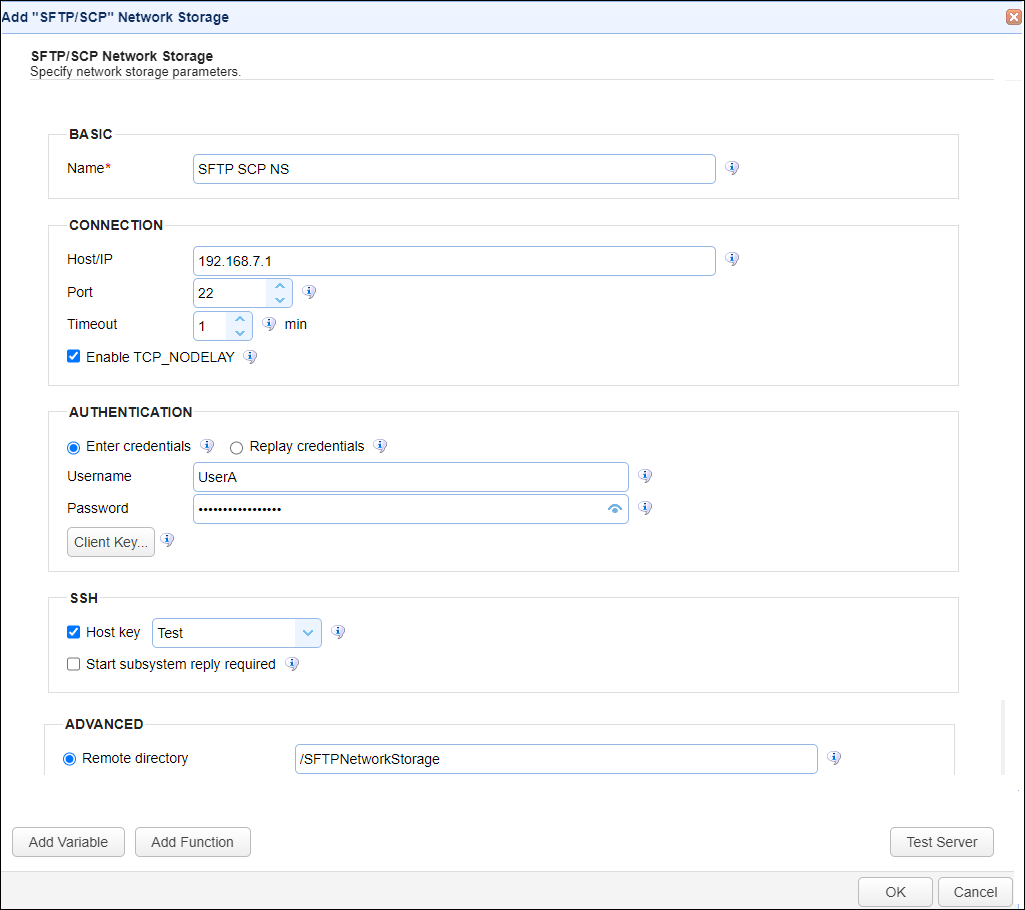SFTP/SCP network storage
The SFTP/SCP network storage option allows you to use an existing SFTP or SCP server as additional storage space.
Adding the SFTP/SCP network storage
In the desired domain, navigate to the ACCOUNTS > Network Storage module. Click on the Add button, or right click anywhere in the grid area and select Add from the pop-up menu. In the Add Network Storage dialog window, select SFTP/SCP as the Protocol, then click on OK. The Add "SFTP/SCP" Network Storage dialog will appear as depicted in the image below.

Basic
Name - The unique name for this network storage.
Connection
Host/IP - The remote hostname or IP address for this network storage.
Port - The remote port for this network storage.
Timeout - The maximum timeout (in minutes) for establishing a connection to remote server.
Enable TCP_NODELAY - If checked, this setting disables Nagle's algorithm
Authentication
Enter credentials - If selected, enables the administrator to set a static Username and Password for all users.
-
Username - The username for connecting to the remote server.
-
Password - The password for connecting to the remote server.
Replay credentials - If selected, uses the current user's credentials instead of a static Username and Password to connect to the remote server. Note: This feature will not work for users who authenticate to the SFTP service via public key authentication.
Client Key - If selected, is used when authenticating with the remote server.
-
Use one-time key - Select this option if you wish to authenticate using a one-time key.
-
User server key - Select this option if you wish to authenticate using an existing server key in the Key Manager.
-
Use key file - Select this option if you wish to authenticate using a file-based key.
-
Key file password - The optional client private key password to use for this connection (FTPS/SFTP).
-
SSH
Host Key - If checked, you will have the option to select a Host key, managed by the Key Manager, from the drop down list.
Start subsystem reply required - If checked, a start subsystem reply is required.
Advanced
Remote directory - If selected, maps the local virtual path to a specific remote path on the target server.
Map current local directory to remote directory - If selected, maps the local virtual path to remote path having the same name as the local virtual path. For example, if network storage is mapped to virtual path /path, then when connecting to the network storage, it will drop the user in /path directory on target server.
Debug log directory - If checked, this is the directory where debug logs will be stored for this network storage.
Max network storage age - If checked, this is the maximum amount of time (in minutes) to keep this network storage connection in the connection pool.
Use adaptive connection - If checked, the adaptive transfer buffer size will be used for better performance.
Tags
Tags - If specified, this is the one or more tags that are used to limit which administrators have access to the network storage.